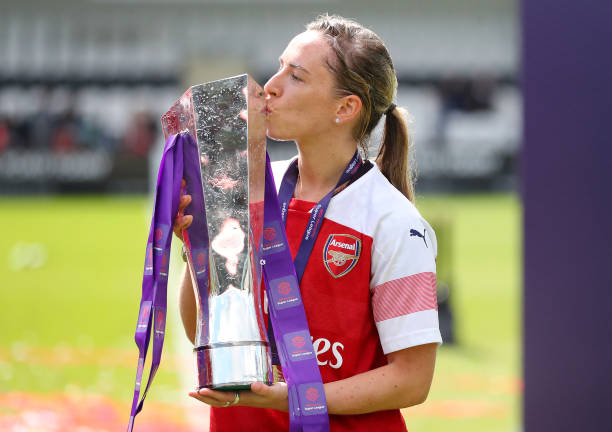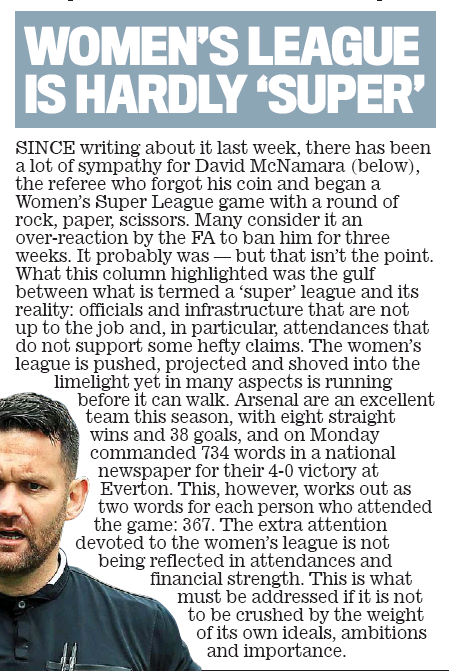As I made my way through the papers, I couldn’t help but notice a distinct lack of coverage regarding Jordan Nobbs’ ACL injury, but I did notice Martin Samuel in the Daily Mail football section complaining that the Women’s Super League just isn’t super enough to warrant coverage in a national newspaper.

His piece, which is small yet all over the place, started as a bit of a gripe about referee David McNamara’s three-week suspension for using rock, paper, scissors to determine who should kick off after he forgot his coin for the toss.
Mostly, though, it seems he just wanted to point out that he thinks he was right about something – “What this column highlighted,” he writes, “was the gulf between what is termed a ‘super’ league and its reality: officials and infrastructure that are not up to the job and, in particular, attendances that do not support some hefty claims.” He doesn’t clarify what these claims are.

Martin Samuel’s first two points, that officials and infrastructure are not up to the job are on the money, but his gripe about attendances is flippant yet clearly where his main problem lies.
The Daily Mail football writer’s misogyny, however, comes to the fore in his next sentence. “The women’s league is pushed, projected and shoved into the limelight yet in many aspects is running before it can walk,” Samuel complains, as if showing the league leaders live via the BBC red button is somehow akin to beaming it straight into everyone’s brains. “The extra attention devoted to the women’s league is not being reflected in attendances and financial strength.” Extra attention!
One of the best midfielders in the women’s game, a player who has been scoring and assisting for fun this season, ruptured her ACL at the weekend putting her World Cup participation for England in doubt. The news, confirmed by Arsenal on Monday afternoon, received no mention in Tuesday’s Daily Mail, Daily Telegraph, or Daily Express, with just a quarter of a column in the Guardian (96 words including the headline), and 18 words in the Daily Star.
An argument could be made that the reason women’s football still struggles these days is precisely because it HASN’T been shoved into the limelight in the ways Samuel suggests, at least not effectively. Imagine the crowds if the Daily Mail football writers made an effort to promote the sport rather than denigrate it.
If you want to know what a successful marketing campaign can do for a sport, just look at how the Premier League was rebranded as the very start of football itself and compare the money in the game now to pre-Sky Sports days.
Daily Mail football writers counting words
In his piece, Samuel also counted the number of words in an article – in a national newspaper no less – about Arsenal’s recent 4-0 win over Everton on a weekend with no Premier League football (734 words) and notes how this was exactly double the attendance at the match. We should all be suspicious of math that tidy. Imagine that, one whole article about one of the leading teams in the country. Saturation point must surely be just around the corner.
While at the end of his piece he seemed to call for the authorities in the game to get their act together, it was hard to read his column and not see it as a snide attack on the women’s game. Herein lies one of the biggest perceived chicken-and-egg problems with women’s football.

Some say there is little coverage of the game because there is little interest while others point to the fact that you need to generate interest to produce it. But the interest in women’s football is absolutely there and always has been, even if the FA did their best to crush it when they banned women’s football for 50 years because it was too popular. It’s just ignored or, at best, not taken seriously.
Football hasn’t always been with us, although it often feels like that. It’s a game that nobody – male, female or non-binary – knew how to play before 1863. By 1920, some women’s games were attracting over 50,000 supporters and some grounds were too small to cope with the demand to watch them play. Tell me again how it is ‘obviously a man’s game’?
It’s not and never has been but to break the cycle we find ourselves in, something is going to have to give. Either the media need to start giving women’s football significantly more coverage to show the public that this is something they can openly care about, or the wider public needs to change its attitude all by itself.
TV wasn’t invented until six years after women’s football was first banned. The BBC only introduced colour television four years before it was restored. By the time women were allowed to kick a ball again the men’s game had seen untold investment and exposure.
I wonder if anyone back then said, ‘it’s not super enough and probably not worth it?’

